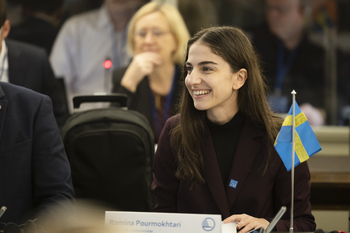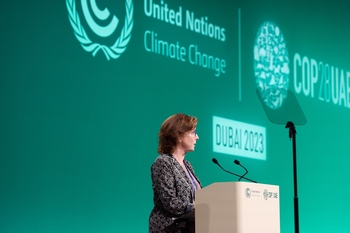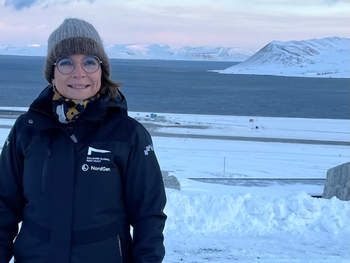Focus on perpetrators of violence
The conference Confronting Gendered Violence: Focus on Perpetrators is being held in Ständerhuset in Helsinki and brings together researchers and experts on the problem from throughout the Nordic Region. The aim is to generate new knowledge within the field and explore ways of halting the spiral of violence.
“Historically, the debate has tended to focus mainly on the victims. However, it is important to shine a light on the perpetrators as well since they are the key to breaking the pattern. This is a hot topic into which considerable research is being conducted,” says Kristín Pálsdóttir.
Kristín is the contact person for the project organising the conference in conjunction with the Finnish Presidency of the Nordic Council of Ministers. The demand for a debate on the problem of the perpetrators has come from multiple sources. The theme of violence is one of the focus areas for both the Nordic equality ministers’ co-operation programme and the Finnish Presidency. This prioritisation has resulted in various organisations, experts, researchers, civil servants and politicians coming together to work on the problem. According to Kristín Pálsdóttir, there has been keen interest in the conference, including from outside the Nordic Region.
“We received enquiries from people who wanted to take part from Nepal, Pakistan, Greece and Palestine, which just goes to shows that there is a thirst for knowledge about the topic,” she says.
The conference lasts three days. Kristín also points out that the idea is to bring together stakeholders from the whole of the Region and compare approaches to the problem. What different alternative treatments do the Nordic countries deploy? What does research into the problem tell us? Another goal is to set up a Nordic network.
“In the long term, we hope that a Nordic network will improve practice throughout the Region. It will represent an important step towards solving the problem,” she says.
Young perpetrators fall between stools
Kristín Pálsdóttir works for the Institute for Gender, Equality and Difference (RIKK) at the University of Iceland. She came up with the idea for the conference when RIKK was evaluating a pilot scheme run by some of the local authorities in Iceland. The pilot project was based on the Istanbul Convention and was about breaking the cycle of gender-related violence via better follow up on reports of violence and stricter penalties for the perpetrators. During the evaluation process, she noticed that the perpetrators were being forgotten.
“In Iceland, there is only one form of treatment available, and it is compulsory for all perpetrators with children. However, this means that young men with no children fall between stools and receive no treatment at all.”
New report maps the situation in the Nordic Region
A new report will be presented at the conference outlining the situation in the Nordic countries. Commissioned by the Finnish Presidency, the report shows the various models used to help perpetrators break the cycle of violence and also covers Greenland, the Faroe Islands and Åland. The questions addressed cover everything from what treatments the countries provide for perpetrators, to the challenges faced and results achieved. Berta Vall, a researcher at the Department of Psychology at the University of Jyväskylä in Finland, has just finished the report and points out that the results show that approaches to treatment vary between the countries and between urban and rural areas.
“The big cities have the most alternatives. It is more difficult for perpetrators in the rural areas to find help. Sweden is an exception to this, and provides treatment at local village level.”
According to Berta Vall, long-term funding is one of the biggest challenges facing the stakeholders.
“It makes long-term planning difficult.”
Norway first in Europe
Berta Vall points out that most of the available treatments are voluntary and based on the model used by the Norwegian foundation Alternative to Violence (ATV). ATV is a research and treatment centre founded in 1987 to counter violence in families and relationships. It was the first in Europe to offer psychological treatment to people who commit such acts.
“The point of the treatment is to stop violence by identifying the gender-related aspect of it, teach the perpetrators to accept their responsibility and encourage empathy with the victims.
The treatment takes the form of either individual or group therapy,” she explains. One thing that distinguishes the Nordic Region is that several of the stakeholders adopt a gender perspective in their treatment. By incorporating this perspective, gender-related aspects of violence are discussed and used to help understand and tackle such behaviour.
“This is unusual in a European context. The Nordic countries are the exception to the rule,” she says.
The Istanbul Convention
Gender-based violence is one of the priorities for the four-year programme for Nordic gender equality work. Päivi Yli-Pietilä works for the Finnish Ministry of Social Affairs and Health and is a member of the Nordic Committee of Senior Officials for Gender Equality.
“Gender-based violence is a problem in all of the Nordic countries, and one that we have not solved yet – despite high rankings for equality in international comparisons,” she says.
The provisions contained in the Istanbul Convention, which was adopted by the Council of Europe in 2011, include calls for measures that target perpetrators.
“Historically, most of the debate has revolved around victims. We need to consider the problem from both perspectives and are really pleased that Norway (the next country to hold the Presidency of the Nordic Council of Ministers, ed.) will continue work on the Istanbul Convention,” Päivi concludes.




